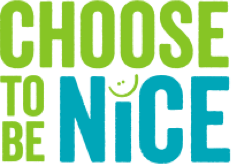 There are many great perspectives on being nice and we want the world to hear them. That’s why we’re launching a special feature on the blog called “Perspectives on Nice,” which is a space for you to share yours. You can write about a special experience you’ve had, an opinion about kindness, the latest research or what you want for your community. It could be a poem, an essay, a news article or even a video. We’re open to suggestions. We want this to be a space for inspiration and motivation. Let’s show the world what it means to be nice.
There are many great perspectives on being nice and we want the world to hear them. That’s why we’re launching a special feature on the blog called “Perspectives on Nice,” which is a space for you to share yours. You can write about a special experience you’ve had, an opinion about kindness, the latest research or what you want for your community. It could be a poem, an essay, a news article or even a video. We’re open to suggestions. We want this to be a space for inspiration and motivation. Let’s show the world what it means to be nice.
Our featured guest this week is Maile Proctor, a professional blogger and content editor who writes on health and fitness, lifestyle and family, advice, how-to and more. Maile is highlighting the health benefits of being nice.
4 Healthy, Brain-Boosting Benefits of Kindness
We all know we’re supposed to be nice to other people, but just because we’re supposed to do something, doesn’t necessarily mean we do it. In fact, according to a survey, 76 percent of respondents say the world is a less kind place than it was 10 to 20 years ago.
Believe it or not, being kind to others can benefit the giver just as much as the receiver, and not just because it’s socially acceptable; being kind can also boost your health. But don’t just take my word for it, check out the science behind it; here are some of the healthy, brain-boosting benefits of kindness.
It’s Good for Your Heart
It’s often said that kind, caring people have big hearts; turns out, there’s more truth to that statement than we realize. While doing nice things for others helps us have more empathy and compassion, it also affects the heart chemically. “Oxytocin causes the release of a chemical called nitric oxide in blood vessels, which dilates (expands) the blood vessels,” according to Dr. David Hamilton, PhD. “This reduces blood pressure and therefore oxytocin is known as a ‘cardioprotective hormone because it protects the heart (by lowering blood pressure).”
So next time someone tells you to “have a heart” and help someone else, you may want to take their advice, you’re not only taking care of someone else, you’re also taking care of your heart.
It Makes You Feel Good

Children learn about helping people with service dogs at a Choose To Be Nice Club.
When you do something nice for someone else, it makes you feel good, too, but do you know why that is? It’s not just because we like to see other people happy, although that’s certainly an added bonus. It’s because doing nice things for others boosts your serotonin, the neurotransmitter that gives us the feeling of satisfaction and well-being.
There have been a number of studies done on the mood-boosting effects of kindness, and the feeling of satisfaction you get from helping others is sometimes called the “helper’s high”. Being kind also releases endorphins, the feel-good chemicals you experience after exercise. When you do something nice for someone else, it’s like getting a good workout, minus the cardio!
It Can Reduce Stress
You may think finding ways to be kind to others is adding one more item to your already-full plate, but spreading kindness can actually lower your stress level rather than add to it. When you do something nice for another person, it affects the way your body responds to emotional stress. According to a study, “findings suggest that affiliative behavior (friendly positive gestures) may be an important component of coping with stress and indicate that engaging in pro-social behavior (actions intended to help others) might be an effective strategy for reducing the impact of stress on emotional functioning.”
Doing something nice for someone else may be just the pick-me-up you need if you’re feeling stressed or having a bad day. Altruistic action can distract you from your own feelings, help you get outside of yourself and give you a new perspective.
It Can Increase Your Lifespan
Being kind to others helps you forge close, meaningful friendships. These relationships don’t just improve your day-to-day life, they can also increase your longevity. According to Health, people who lack a strong network of friends and family are at a greater risk of developing and dying from heart disease.
The good news is it doesn’t take an elaborate plan or excessive effort to be kind to others; even the smallest gesture can have a significant impact. Acts of kindness are only limited to your willingness and creativity. So next time you do something nice for someone else, remember, you’re not just making them smile, you’re boosting your health while you’re at it. What are your favorite ways to spread kindness? Let us know in the comments below!

